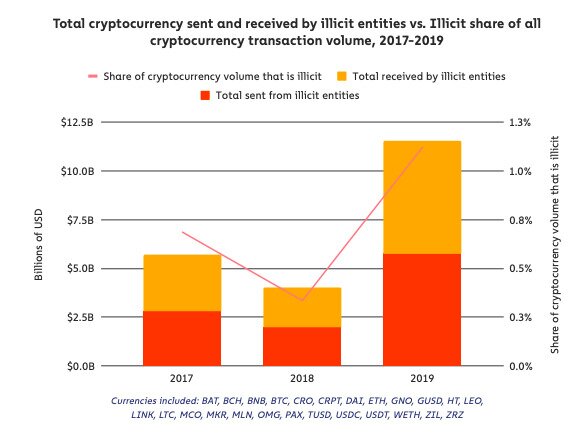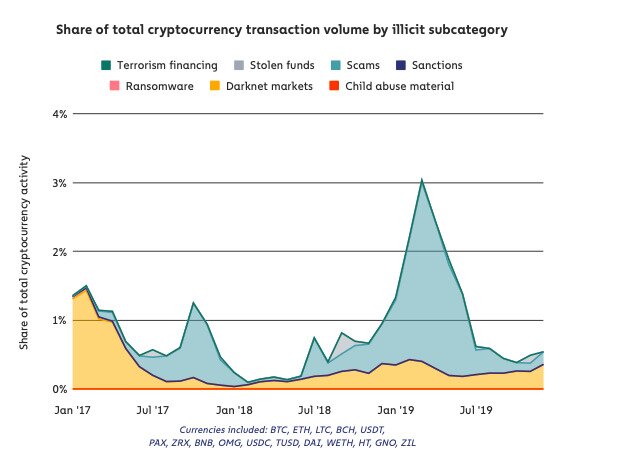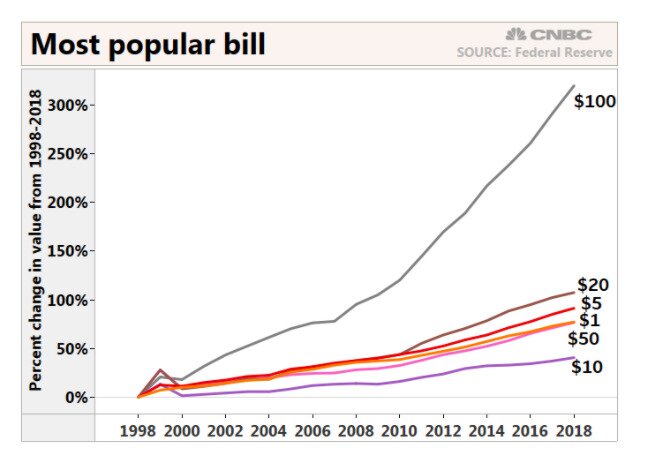- >News
- >No, Bitcoin Isn’t As Popular With Criminals as Previously Thought
No, Bitcoin Isn’t As Popular With Criminals as Previously Thought
It has almost become a truism that bitcoin is hugely popular with criminals. You may have even heard credible people say that the cryptocurrency is mostly popular with criminals, and that money laundering is its most common use. If you have, you may be surprised to hear that such claims are largely untrue, and that criminal activity makes up only a tiny fraction of total bitcoin use.
Even now, mainstream news outlets run with the story that bitcoin is beloved by criminals and scammers, but largely ignored by others. This isn’t true, and while a proportion of the bitcoin supply is being used for nefarious ends, it pales into insignificance compared to the proportion of cash used illicitly.
Bitcoin Is Used Mostly By Criminals. Really?
Bitcoin has had a very strong 2020, with even mainstream investors and corporations admitting that it has great potential as a store of value. But it seems that much of the general media hasn’t actually read this memo, with articles about bitcoin’s illicit still prevalent.
A good recent example of this was provided by PYMNTS.com, a news website focusing on fintech and payments. It published an article a week or so ago titled, “Scammers Love Bitcoin, But Consumers Aren’t So Enthusiastic.”
Basically, the gist of the piece is that scams involving crypto are on the rise, although it doesn’t provide specific figures or put crypto-related scams in the wider context of all fraud. It also lumps bitcoin in with crypto as a whole, while claiming that the cryptocurrency isn’t really used as a legitimate means of payment.
This latter claim is misleading: research from insurer HSB indicates that around 36% of American small- and medium-enterprises accept cryptocurrency payments, while BitPay data shows an increase in bitcoin payments this year.
Regardless, the popular perception of bitcoin as the criminal currency of choice is still widespread, and will remain so for as long as websites and newspapers continue pushing this narrative. But it’s largely wrong, as indicated by data from Chainalysis.
Chainalysis’ 2020 Crypto Crime Report found that, across 2019, only 1.1% of all cryptocurrency transactions relate to illicit activity.
Source: Chainalysis
There was an increase in 2019 relative to previous years, but when Chainalysis breaks the data down further, it shows that the main driver of 2019’s rise — scam activity — collapsed towards the end of 2019.
Source: Chainalysis
As you can see above, scams made up 3% of all cryptocurrency transactions towards the end of Q1 20219, but this fell to just less than 0.5% of all transactions. This may have resulted from either a spike in legitimate transactions, or from people becoming wiser to possible scams.
Either way, it’s clear that criminal activity forms only a small subset of bitcoin transactions. And it’s not only Chainalysis which has come to such conclusions.
In 2019, MIT’s IBM Watson AI Lab and crypto security firm Elliptic found that only 2% of all cryptocurrency transactions could be classified as illicit. Meanwhile, CipherTrace data shows that cryptocurrency thefts, frauds and hacks totalled $4.5 billion in 2019, yet this is only 0.032% of the $13.8 trillion in volume which was traded that year, according to TokenInsight data.
Cash Is More Criminal Than Cryptocurrencies
Cryptocurrency-related crime may have grown relative to previous years. But it still remains on the margins of all crypto activity, despite what you may have heard.
Bitcoin-related criminal activity is always likely to remain proportionally low, since bitcoin is a decidedly bad cryptocurrency with which to conduct illicit activity. It has been known for several years now (at least among those who care to read a little deeper) that Bitcoin isn’t anonymous, and that money-laundering activity using bitcoin can be traced.
With Bitcoin immutably registering every single transaction on its blockchain, a criminal either has to be stupid or desperate to use it for money laundering. And in fact, if you look at data on money laundering outside of crypto, you’ll see that cash is used more frequently than bitcoin.
For example, the United Nations Office on Drugs and Crime estimates that as much as 5% of global GDP — or $2 trillion in U.S. dollars — is laundered every year. At the same time, a September report from Swift concluded that “Identified cases of laundering through cryptocurrencies remain relatively small compared to the volumes of cash laundered through traditional methods.”
If you look closer, you’ll also find that cash is used much more frequently for illegal activities than cryptocurrencies, even as a proportion of total cash supply. Prominent Harvard economist Kenneth Rogoff has suggested that around a third of cash in circulation in the United States is used by criminals and tax evaders.
It’s also interesting to note that the number $100 in circulation around the world hit its highest ever level in 2019, indicating a surge in demand from criminals. The supply rose to $1.42 trillion, representing a rise of 6% compared to 2018, when the supply of $100 increased by 7% compared to 2018.
Source: CNBC/Federal Reserve
Here’s the main takeaway of all this: bitcoin and cryptocurrency are not special or extreme cases. For whatever reason, human beings have a tendency to commit crime, and they will use whatever financial medium they can to facilitate such crime. In a small number of cases this is cryptocurrency, yet it seems that in the vast majority of instances this is cash and U.S. dollars, which seem to be not only more available, but are also more difficult to trace (at least compared to bitcoin).
So the next time someone tells you that only criminals use bitcoin, remind them of the most popular criminal currency of all: the U.S. dollar.







